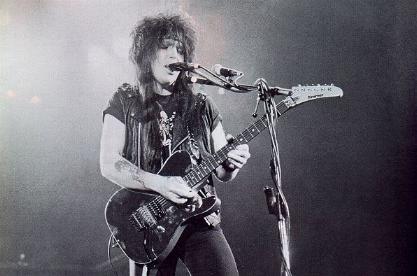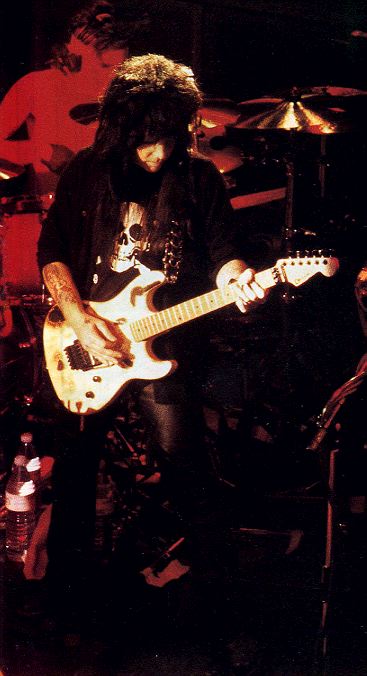
THIS INTERVIEW WAS ORIGINALLY PUBLISHED IN HIT PARADER
MAGAZINE AFTER THE RELEASE OF DR. FEELGOOD.

 BY MARK SIMPSON
BY MARK SIMPSON
Mick Mars is often the forgotten man of M�tley Cr�e. Without the charisma of vocalist Vince Neil, the brains of bassist Nikki Sixx, or the wildman image of drummer Tommy Lee, the guitarist if often relegated to the role of, "the other guy" in the Cr�e attack. But those who don't give Mars credit fail to recognize the vital role he plays in the Motley men. His inventive guitar licks, while admittedly not setting new trends in the metal world, add the perfect touch to the band's tales of lust and adventure. And let's not forget that in a field dominated by groups with dual guitarists, Mars handles his six-string chores single-handedly -- just one more reason to tip one's cap to the man Sixx has called, "the backbone of this entire band."
Hit Parader: Mick, has it bothered you that you've never gotten the kind of critical recognition you might feel you deserve?
Mick Mars: We've never been a critics band, so on that level it doesn't bother me. On the other hand, it does annoy me a little that the recognition I get for playing isn't always there. But when I look at most of the guitarists who are getting the attention these days, I kind of understand why I'm not included. Most people seem to be really fascinated by speed players, the guys who just tear up and down the fretboard as fast as they can. That's not what my playing is all about. There are alot of guitarists who I think just show off at times. I don't really want to do that. My goal is to just play what a song needs. If I need to play fast I do, but if I can get by with just a few solid chords, that's good enough for me.
HP: Do you ever listen to other players and wish you could play like them?
MM: Sure, Jeff Beck is one guy I've always admired. He can play in so many ways and always bring a lot of emotion to what he is doing. He always takes chances and he always makes it interesting for the people who are listening to him play. You never know what he's gonna try next, and part of the fun is that I don't think he knows what's coming next either. I know I'm never going to be a virtuoso like a Steve Vai, though I admire his work a great deal, but if I could have longevity like a Beck or an Eric Clapton that would be great. I'll be interested to see how many of the young hot shots of today are around in ten years. I've got a feeling that I will be, in one form or another.
HP: Does that mean that you see a musical life for yourself after M�tley Cr�e?
MM: I don't think about it in those terms... but, yeah. I'm thiking about learning a few new things -- like taking classical guitar lessons -- and I'd like to bring what I learn into hard rock. I'm very happy with M�tley Cr�e, but as I said before, I really admire the guys who hang around for twenty years, and I'd love to be one of 'em. If M�tley Cr�e is around for twenty years, then I'll still be there. If not, then I'll still be around music. Hey, playing guitar is what I do -- I don't really know anything else.
 HP: How has your playing changed on Dr. Feelgood?
HP: How has your playing changed on Dr. Feelgood?
MM: It's gotten better. I took things a little more seriously this time, and the results show that the effort I put into the album paid off. Maybe it's because I was sober throughout the entire recording process that things turned out as well as they did. Being sober gives you a lot more pateince. On our earlier albums, it wasn't unusual for me to finish all my guitar parts in a couple of weeks. I'd lay something down and if I liked the feel of it, I'd think that it was good enough. On Dr. Feelgood, I didn'r let myself get satisfied so easily. I went over things that everyone else was telling me were great, but which I wasn't satisfied with. We spent 6 months in the studio this time, and the guitar parts on the record show the difference.
HP: You mention the fact that you're sober now, as is the rest of the band. How much of an impact has your sobriety had on your life?
MM: When I drank, I had a very different attitude towards my playing. It was sloppier but I kind of liked it that way. It was like the alcohol was telling my mind what to do. Now, I realize that all the drinking made me think I was playing better than I actually was. I was never really a drunk -- I just drank 'til I thought I was loosened up enough to be creative. But now I see that I was drinking too much and that it had a negative impact on my playing and on my life. Drinking doesn't make you play better, believe me.
HP: How does your playing style change from the start of a road tour to the end?
MM: I hope I get better as a tour goes along. When you're playing every night, you'd better improve. I know there are things on the new album that I feel much more comfortable with now than I did when we first went out. By tour's end, I hope that I'll have learned a few new tricks that I can use on the next album. That's always a nice goal to have.
HP: After ten years in M�tley Cr�e, is it still as much fun to be one of the bad boys of rock and roll?
MM: I'm kind of glad we've toned down the image a bit recently. We had gotten kind of heavily into the whole glam thing around the time of Theatre of Pain, and I really wasn't comfortable with that. Now when people say M�tley Cr�e, I want them to think of us as just a great rock and roll band. We don't do drugs anymore, we don't drink anymore -- though we still can get pretty wild at times. But yeah, it's still as much fun as ever. It's really kind of cool.
HP: If you could be granted one wish in life, what would it be?
MM: Do you mean what would her name be? (laughs) That's a tough one, but I guess if you're talking strictly from a musical level, it would have to be that I could become a better guitarist. I am doing my best to get there. I'm probably going to take some lessons to learn some new things. I really love the guitar, I want people to understand that. Maybe my wish would be for more people to believe that I'm very serious about what I play.
